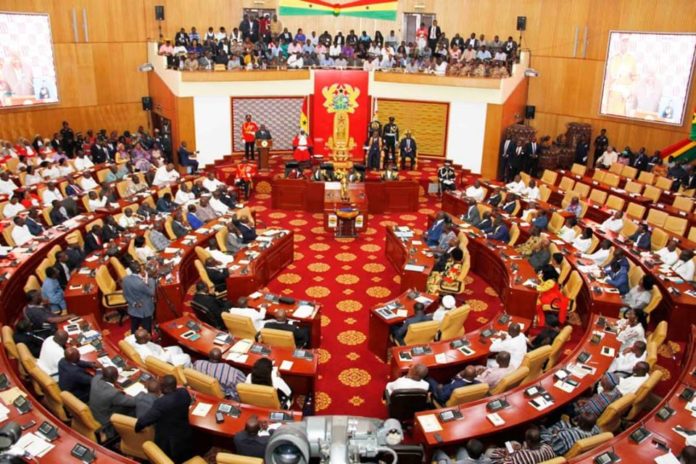|
Getting your Trinity Audio player ready...
|
Parliament has on Wednesday July 29th 2020 approved the Mid-Year Review of the Budget Statement and Economic Policy of the Government and the sum of GHS 11,896,477,566.00 as Supplementary Estimate for the 2020 Financial Year.
The Minister of Finance, Ken Ofori-Atta, on Thursday July 23rd moved a motion in the House to seek parliamentary approval to spend the additional monies to support Government expenditure for the rest of the year and was subsequently seconded on Monday 27th July by the Chairman of the Finance Committee and MP for New Juaben South Mark Assibey-Yeboah.
The Minister by the motion also sought to amend the 2019 Appropriation Act which gave him the authority to spend GHC 98,036,692,358.00) from the Consolidated Fund and other public funds for the 2020 fiscal year.
The House has allowed other Members of Parliament (MPs) from both sides of the political divide to speak for or against the 2020 Mid-Year Review and Financial Policy Statement presented by the government at the beginning of the week and Wednesday was for the leaders.
The lawmakers wound up debate on the Mid-Year Budget Review Statement with the Majority Leader Osei Kyei-Mensah-Bonsu and his counterpart leader of the Minority, Haruna Iddrisu, giving reasons for the economy performing better or otherwise for about one hour.
The Majority Leader by convention, mostly, if not all the time, has the final say, same of which was experienced today, as the Minority Leader Haruna Iddrisu took his turn before Osei Kyei-Mensah Bonsu, the Majority Leader and Minister for Parliamentary Affairs.
He opened his debate with a mockery of the budget document following some discrepancies in the presentations as the Finance Minister had to amend the policy statement before printing the final document out for the MPs and added that the Budget review was a sermon of manifesto promises and pledges rather than Mid-Year Budget Review.
The Tamale South lawmaker described the Review as more of a political pledge and more as a manifesto pledge into the 2020 elections rather than a Mid-Year Review of the Budget which he believed was not principled enough and added that Ofori-Atta failed to give a proper account of some monies.
He indicated that the legality of the borrowing of some GHS 100 billion for the Bank of Ghana’s asset purchase programme is questionable and stated that the Public Financial Management Act and the Constitution require that Governor of the Bank must refer to article 181 of the Constitution when they intend to borrow.
The Majority Leader Kyei-Mensah Bonsu in his contribution declared that when the New Patriotic Party (NPP) government took over the administration of the country, it was compelled to extend the International Monetary Fund (IMF) programme started by the erstwhile National Democratic Congress (NDC) government because the NDC had missed the targets it had agreed with the IMF.
He specified that even though the NPP inherited a collapsed economy from the NDC due to its abysmal performance the NPP are the best managers of the economy since every single microeconomic indicator had improved since the party took over in January 2017 making the economy buoyant, while the Bank of Ghana (BoG) had been working to clear all the mess in the country’s financial sector.
Whilst acknowledging the crucial role adequate power supply plays in attracting investment, he also observed that low levels of inflation, interest’s rates and fluctuations in the exchange rates are equally important.
He concluded his presentation with a call for continuation in leadership of President, Nana Addo Dankwa Akufo-Addo’s government, which according to him was the best to steer the country out of the economic quagmire since attainment of independence.
Winding up debate on the motion, the Finance Minister concluded his presentation with an overview of macroeconomic developments, analysis of revenue, expenditure, and financing performance for 2019 and the first half of 2020 and a revised fiscal outlook for the remainder of the financial year with an overview of the implementation of the 2020 Budget.
He indicated that even though events of the coronavirus are still unfolding, preliminary analysis undertaken by the Ministry of Finance shows that the virus will impact negatively on petroleum receipts due to the collapse of international crude oil prices, custom receipts, expenditures especially health-related and financing conditions on the fiscal front.
Ken Ofori-Atta announced measures that are being put in place to close a possible financing gap in the 2020 budget that could result from the impact of the virus including withdrawal from the Ghana Stabilisation Fund occasioned by anticipated shortfalls in the Annual Budget Funding Amount (ABFA).
He dismissed assertions from certain quarters of a projected negative growth rate and expressed optimism that with good management, the economy would reach an average growth rate targeted in the 2020 Budget Estimate for the country would move out of the least developed countries bracket forced by the coronavirus pandemic.
The Minister believed the government had taken would continue take resolute measures to improve the business environment for the private sector including significant improvements in business regulations and their implementation, digitisation, expansion of access to finance.
He mentioned that “The CARES Revitalisation and Transformation agenda is about national survival and security, just like our response to the COVID-19 pandemic itself and therefore called for all-hands to approach with a resolute focus on implementation.
He gave the assurance that the Nana Addo Dankwa administration is the best to steer the country out of the economic quagmire forced by the coronavirus pandemic and will continue to pursue a ‘Whole-of-Government’ approach in close collaboration with and support to the private sector.
Source: Daily Mail GH





